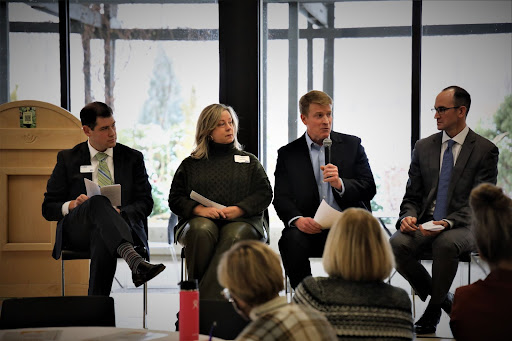United Way of Central Iowa lays out advocacy agenda for 2023

MICHAEL CRUMB Dec 19, 2022 | 2:47 pm
6 min read time
1,469 wordsAll Latest News, Government Policy and Law, Nonprofits and PhilanthropyLance Henning, CEO of Greater Des Moines Habitat for Humanity, speaks about housing during a panel discussion at the United Way of Central Iowa’s Advocacy Agenda Breakfast on Friday at the Greater Des Moines Botanical Garden. Other panelists included Luke Lynch, OpportUNITY director for the United Way (far left) and Cynthia Latcham, executive director at Anawim Housing. The discussion was moderated by Joe Murphy, chair of the United Way’s Public Policy Cabinet. Photo by United Way of Central Iowa.
The United Way of Central Iowa released its advocacy agenda for the 2023 legislative session Friday, identifying five priorities it says are needed to make the state a thriving place to live, work and play.
The United Way hosted the breakfast event at the Greater Des Moines Botanical Garden, where it listed its priorities as early childhood success, education success, economic opportunity, health and well-being, and essential needs, which includes things such as housing, public transportation and food security. Under each priority were recommended measures or actions to be taken to achieve the goals.
Dave Stone, advocacy officer for the United Way of Central Iowa, said developing the advocacy agenda is a collaborative process.
“It really begins in June, and we go to the community, we go to our funding partners and we go to our multiple coalitions and we have a series of conversations about mission success, barriers, regulations, funding, what areas do the community really needs us to work on in terms of advocacy at the local, state and federal levels,” he said.
Friday’s meeting included two panel discussions focused on early childhood education and housing.
Stone moderated the first discussion on early childhood education, which featured Dawn Oliver Wiand, president and CEO of the Iowa Women’s Foundation, and Kay Strahorn, director of Conmigo Early Childhood Center in Des Moines.
Oliver Wiand and Strahorn shared data and information about challenges facing the early child care industry, including the lack of available child care openings, and a shortage of child care workers brought about primarily because of low wages.
Oliver Wiand said there is a shortfall of 346,000 spots in child care, with 53,000 in Polk County.
There also has been a large number of closings of child care centers in recent years, she said.
“We have lost 28% of our child care businesses in the past five years, and we have lost 56% of them in the last 10 years,” she said. “We cannot keep losing our programs at that rate.”
Oliver Wiand also said the state has lost 34% of child care programs accepting child care assistance in the past five years, and 60% in the past 10 years.
“So that’s a lot of businesses going out of the child care world,” she said.
Iowa is also one of the most expensive states for child care, with a two-parent household with both parents working having to pay 11.9% of their income toward child care, while a single-parent household pays more than 40% of their income toward child care.
According to the Department of Human Services and Child Care Aware of America, 7% is considered the affordable rate of income spent on child care, Oliver Wiand said.
Oliver Wiand also discussed wages paid to child care workers, saying the average hourly wage for a child care worker in Iowa is $10.73, the third-lowest-paid profession in the state, which Oliver Wiand said ranks Iowa 46th in the nation.
“Low wages and lack of benefits are barriers to attracting and retaining the staff for the workforce,” she said.
Strahorn said Conmigo has been able to increase its starting wage to $11.50 an hour, but only because of COVID stabilization grants the center received. But even at the high end, a teacher with 27 years’ experience is only making $17.37 an hour, she said.
“So it’s a real shame that a professional in the early child care and education field is making that low of a wage,” she said. “So it’s the low end, but also the high end is a shame, too.”
Strahorn also discussed the level of child care assistance that centers receive, saying 65% of her centers’ families are on child care assistance.
“The CCA rates haven’t increased since January 2019, I believe, and a lot has happened in four years with COVID and the changing workforce everywhere,” she said. “Those CCA rates need to be increased again, and what we’d love to see happen is that the rates would rise annually like inflation. And just like everything, we need those CCA rates to rise, too, and if that would happen, I’m sure more centers would accept families on child care assistance.”
The second panel discussion featured Cynthia Latham, executive director of Anawim Housing, Lance Henning, CEO of Greater Des Moines Habitat for Humanity, and Luke Lynch, the OpportUNITY director for the United Way of Central Iowa.
The discussion was moderated by Joe Murphy, chair of the United Way’s Public Policy Cabinet.
Latham said there are a lot of housing challenges facing the state and Central Iowa.
“We can start with just the lack of affordable housing, and just the units that we need in our community is kind of staggering,” she said. “It’s incredibly hard to develop affordable housing with all the parts and pieces and entities we need to work within throughout both the state and local levels [and it’s] complex, so bringing new buildings into the community is not easy at all.’
Henning said supply is a major challenge.
“It’s a challenge for some time now, and an indicator for that is housing costs are increasing at a faster place than inflation,” he said. “It’s been happening for more than a decade in Central Iowa, and it’s been exacerbated over the past couple of years.”
Henning said there is also a perception problem when it comes to workforce housing, saying it includes child care workers, snow removal workers, delivery drivers, retail workers and health care workers.
Forty percent of households in Des Moines would qualify for Habitat for Humanity housing, he said.
“A teacher with five years’ experience would qualify for Habitat for Humanity housing financially,” Henning said. “When we look at who our homebuyers are, No. 1 is light manufacturing and then No. 2 is health care.”
There’s also a continued challenge with racial equity in housing, Henning said.
While the homeownership rate in Polk County is 73%, for the Hispanic community it is 57% and for Black residents it’s 26%, he said.
“When you think about wealth creation, there’s a serious gap that still exists, and challenges around that perception and racial equity all play into the challenges around housing,” Henning said.
Lynch said everything is connected, whether it be housing, child care or food insecurity, and “you can’t focus on one without focusing on all of them.”
“If somebody is spending 40% of their income on child care — and we know that somebody is housing burdened if they are spending more than 30% — there’s not a lot of money left over for the rest of their basic needs,” he said.
According to Lynch, a workforce housing study done a few years ago showed that the Des Moines metro will hit 1 million people by 2040.
“And the majority of those, the new jobs coming to town are going to be making a household income of less than $75,000, so how do we plan for that?” he said. “We already know we have a supply problem. How do we make sure we’re growing the right way?”
He said housing tends to be a very local issue, and differs from community to community.
A Capital Crossroads initiative, Here we Grow, has resulted in meetings with city staff in area communities, Lynch said.
There have also been conversations with homebuilders to talk about zoning, and how that can be approached to help increase affordable housing.
Henning said a couple of policy initiatives address how zoning affects the cost of housing, making it difficult to build smaller homes and accelerate the number of homes that are being built.
The other is property taxes, he said.
“How do we think about affordability as part of the property tax reform discussion?” Henning said. “For us at Habitat, more and more we’re seeing homeowners paying more in their escrow than they are in the mortgage.”
He also said funding approved last year to renovate dilapidated properties should continue to increase supply.
Latcham said the state needs to build on the Low Income Housing Tax Credit to give developers more time to develop a pipeline for housing.
She also called for “eviction expungement,” so an eviction doesn’t stay on someone’s record, which can be a barrier to housing.
The 2023 legislative session is scheduled to begin on Jan. 9. The Business Record’s virtual Legislative Forecast is scheduled for Jan. 10.










